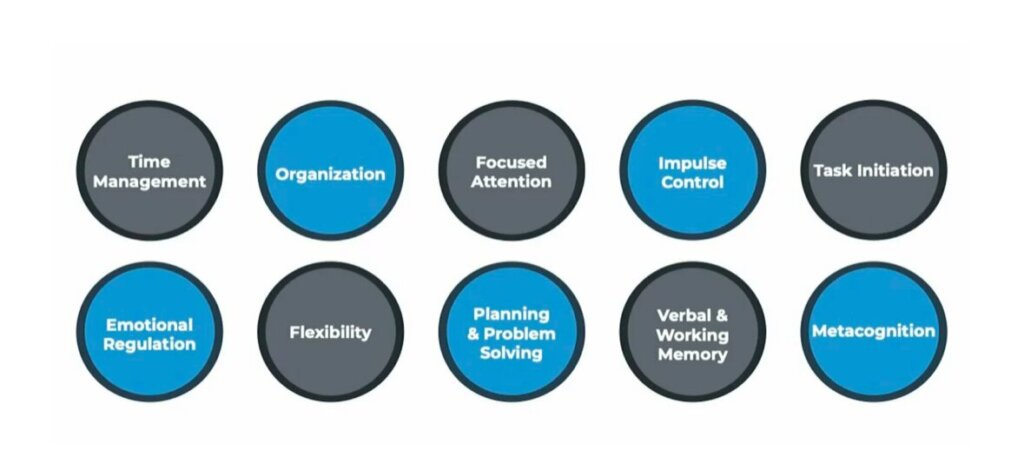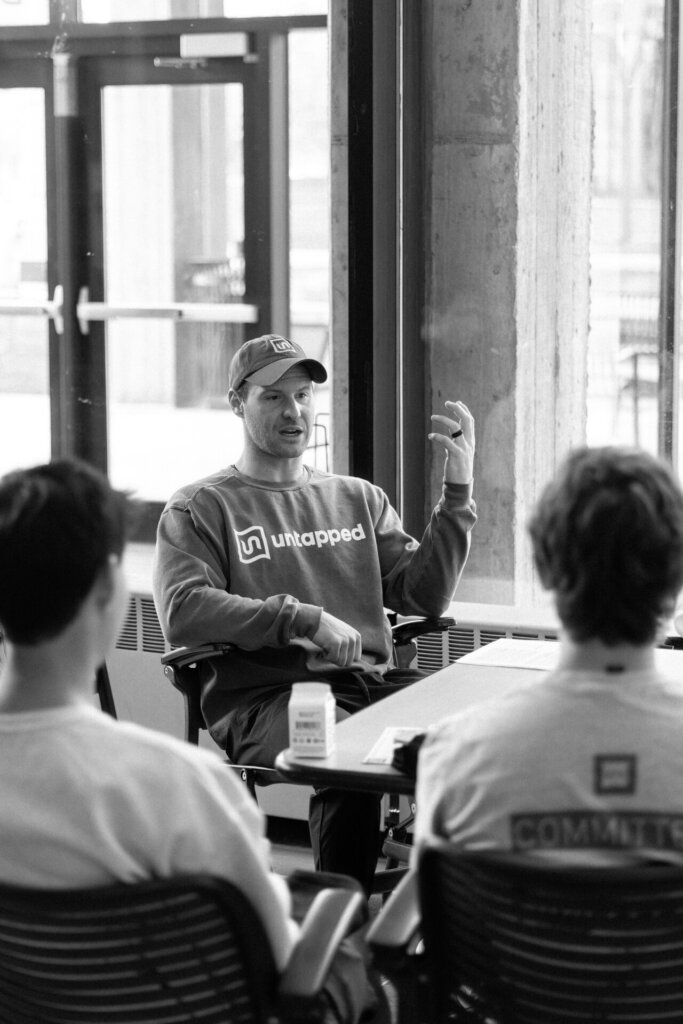If you’re reading this, you’ve probably said or at least thought something like:
“We know he has it in him, but he just can’t seem to get on track.”
“Our other kids don’t have these issues. Why does this one feel so hard?”
I’ve heard those words more times than I can count. Parents usually come to Untapped after years of frustration, confusion, and worry. They see a smart, funny, capable kid who keeps falling behind, losing assignments, or melting down over homework. And they feel helpless watching the cycle repeat.
I understand that frustration deeply because I lived it.
I was that kid who had potential but couldn’t seem to organize his backpack, remember deadlines, or finish homework before midnight. For years, I just thought I wasn’t trying hard enough. I wasn’t diagnosed with ADHD until high school. Once I learned why I was struggling, everything changed.
Learning a few simple executive function skills like physically organizing my materials, chunking big assignments into smaller steps, and building realistic routines transformed the way I approached school. I stopped seeing myself as lazy and started understanding how I learn best.
Now, as both an executive function coach and marketing lead at Untapped Learning, I help students find that same shift in perspective. I work with bright, capable, often resistant students who remind me of myself: smart to a fault, but stuck because no one ever taught them the skills behind success.
What Are Executive Functioning Skills?

Executive functioning skills are the mental processes that allow us to plan, organize, start tasks, manage emotions, and follow through. They’re not character traits. They’re skills that can be taught, practiced, and strengthened.
At Untapped, we focus on ten core skills that form the foundation for both academic success and personal growth.
1. Time Management
Time management helps students estimate how long tasks will take, prioritize responsibilities, and meet deadlines.
Many students simply can’t feel time. I’ve coached kids who think an hour passed when it’s been ten minutes and others who underestimate everything until it’s midnight.
Try this:
- Use visual timers or color-coded calendars.
- End each day with a quick “look ahead” for tomorrow.
- Model time awareness out loud. For example, “I have 30 minutes before my meeting. I’ll spend 20 writing and 10 reviewing.”
2. Organization
Organization isn’t just about clean backpacks. It’s about creating systems that reduce chaos.
When this skill is weak, mornings feel like scavenger hunts. A missing Chromebook charger can derail an entire day.
Support it by:
- Assigning a home for everything: folders, charger, shoes.
- Scheduling a weekly clean-out.
- Helping your student create one master list of responsibilities instead of ten sticky notes.

3. Focused Attention
Attention is the ability to stay engaged even when something isn’t instantly rewarding.
ADHD brains chase novelty. If the task isn’t interesting, the brain searches for dopamine elsewhere.
Strategies:
- Try short, timed bursts of focus followed by short breaks.
- Move before sitting down to work; physical activity boosts concentration.
- Remove unnecessary digital distractions by putting the phone face-down and turning notifications off.
4. Impulse Control
Impulse control allows students to pause before acting. For some, that means resisting the urge to check their phone. For others, it’s blurting out in class.
We teach students to pause and plan, a simple, repeatable habit that strengthens over time.
You can help by:
- Practicing short pauses before responding. Encourage your student to take a breath and think it through.
- Reinforcing moments of self-control with praise rather than punishment.
5. Task Initiation
Getting started can feel impossible when the task seems huge or vague.
Students often tell me, “Once I start, I’m fine.” That’s the clue. Starting is the skill.
Help them begin by:
- Breaking assignments into the tiniest possible first step.
- Using the two-minute rule: if it takes less than two minutes, do it now.
- Building a predictable start-of-homework ritual such as snack, timer, then task.
6. Emotional Regulation
When frustration or anxiety take over, the thinking brain shuts down. Emotional regulation helps students recover instead of spiral.
As a coach, I’ve seen countless Sunday-night meltdowns. It’s rarely about laziness; it’s about fear of failure.
To build this skill:
- Validate before fixing. “I get why you’re upset. This feels huge.”
- Offer coping tools such as breathing, journaling, or a five-minute walk.
- Debrief afterward. Ask, “What helped you calm down last time?”
7. Mental Flexibility
Also called cognitive flexibility, this is the ability to adapt when plans change or mistakes happen.
I once worked with a student who panicked every time her teacher switched due dates. We practiced viewing change as feedback instead of failure and her stress dropped immediately.
Ways to strengthen it:
- Model calm reactions to surprises.
- Encourage creative problem-solving by asking, “What’s another way we could approach this?”
- Play strategy games that require adjusting mid-way.
8. Planning & Problem Solving
Planning connects ideas to action. It’s mapping the steps from “I have a project” to “It’s done.”
Students who lack this skill often jump in without a plan or get stuck trying to make it perfect.
Support planning by:
- Working backward from deadlines.
- Helping chunk large projects into checkpoints.
- Asking guiding questions like, “What’s your first step?” or “What could go wrong and how would you handle it?”
9. Verbal & Working Memory
Working memory is the brain’s Post-it note. It holds instructions, reminders, and bits of information just long enough to use them.
When it falters, students forget directions the moment they hear them.
Boost it with:
- Repetition and visualization. “Say it, see it, write it.”
- External supports like whiteboards, sticky notes, or digital reminders.
- Encouraging students to ask clarifying questions before starting.
10. Metacognition
Metacognition is thinking about thinking. It’s how students evaluate what worked, what didn’t, and what to try next.
This is the self-awareness piece that turns skills into habits.
Develop it through:
- Weekly reflection. “What helped you succeed this week?”
- Noting one improvement goal for the next week.
- Celebrating small wins because progress fuels motivation.

Why These Skills Matter
When students learn these ten skills, everything changes. School stops feeling like a series of emergencies and starts feeling manageable.
Parents notice less tension at home. Teachers see more follow-through. And most importantly, students begin to feel capable, not just smart.
I’ve seen students who once hid missing-assignment reports start emailing teachers proactively. I’ve watched anxious kids walk into finals week calm because they have a plan. That’s the transformation that keeps our team inspired.
How Untapped Learning Builds These Skills
At Untapped, we use what we call the REP Framework: Relationships, Executive Function Skill-Building, and Personalization.
Relationships: Progress starts with trust. Every student is paired with a coach who listens first and challenges second.
EF Skill-Building: We teach these ten skills through movement, reflection, and real-world application, not lectures.
Personalization: No two students learn the same way, so every plan is tailored to their needs and schedule.
Our mission is to help students and families replace constant conflict with consistent growth.

Take the First Step
You don’t have to figure out which skill your student is missing on your own. We’ve created a quick tool to help.
📘 Download the Executive Functioning Skills Self-Assessment Worksheet. This is the same resource our coaches use to pinpoint strengths and areas for growth. It’s a simple first step toward helping your student feel capable, organized, and confident.
When we teach students how to plan, focus, and follow through, they stop feeling like something’s wrong with them and start realizing how much potential they’ve had all along.
If you’re ready to learn how executive function coaching can help your student thrive, reach out to our team at Untapped Learning to get started.





